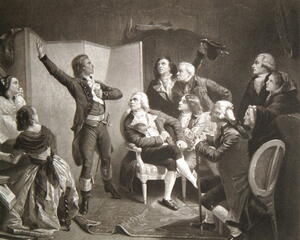The story of la Marseillaise
On Tuesday 14 July, France commemorates the taking of the Bastille, a royal prison in Paris that symbolized the arbitrary power of the Monarchy. The event marked the beginning of the French Revolution—a storm that was to engulf the country for more than six years.
For 220 years Bastille Day has been celebrated as the French Fête Nationale. On this occasion, the martial lyrics of the French national anthem will resound in every city, town and village across the land. La Marseillaise and its call to drench the furrows of the land with the tainted blood of the enemy hordes will be sung by schoolchildren, mayors, army personnel, pop stars, divas and veterans from last century's wars.
Despite repeated calls to replace its aggressive lyrics by more brotherly ones, la Marseillaise has remained untouched since it was composed in 1792 as "The war song for the Army of the Rhine." The year was one of great peril for the young Revolution: foreign armies were massing at the borders and threatening to restore King Louis XVI—not beheaded yet—to his throne.
Alarmed by the situation and by popular unrest in Paris, the Legislative Assembly issued a call for volunteers. In Marseille, 516 young men answered by forming a battalion and decided to march on to the capital. The Fédérés, as they were called, left Marseille on 3 July and walked for 26 days until they reached their destination. All the while they sung and their favourite chant was that new "War song for the Army of the Rhine" they had heard at a meeting held in Marseille the previous month.
The Fédérés were young and being from Marseille, they were loud, enthusiastic and outgoing. They made a strong impression on the people they met on their way to Paris and, quite naturally, the war song they sang became known as the song of the Marseillais—in short, La Marseillaise.
The song was adopted as the Republic's national anthem in 1795, and then banned under Napoleon's rule and the subsequent return of the Monarchy. Only in 1879, under the Third Republic, was it reinstated as France's national anthem—complete with "bloody tyrants," "mercenary phalanxes," "sublime pride," and "avenging arms."


